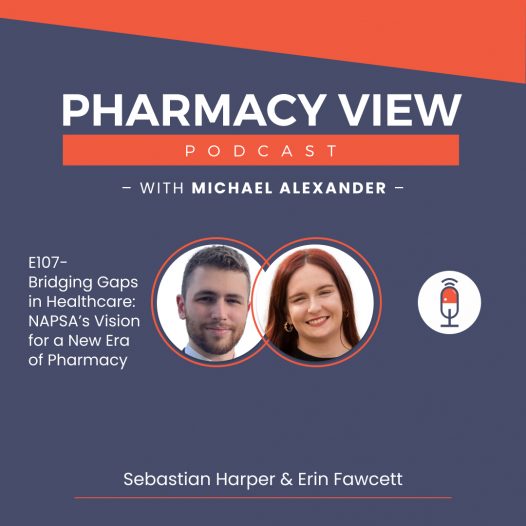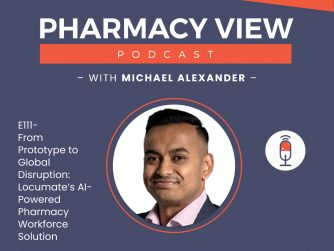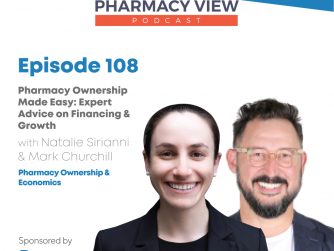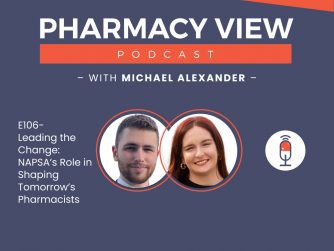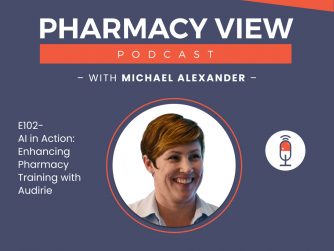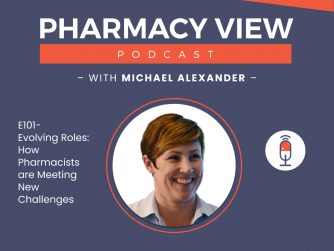In this captivating second part of the Pharmacy View Podcast’s Rx to Riches stream, international host Michael Alexander, a Pharmacist, entrepreneur, digital health enthusiast, Co-Founder of Audirie, and the Regional Vice-President of Health Plans at Omada Health, continues his insightful conversation with Erin Fawcett, the Executive Director of Education and Professional Development at NAPSA, and Sebastian Harper, the National President of NAPSA. Together, they explore how NAPSA is driving innovation in Pharmacy education and empowering students to excel in a rapidly evolving healthcare landscape. From AI-driven tools to fostering interprofessional collaboration, this episode sheds light on the transformative initiatives shaping the future of Pharmacy practice.
The discussion delves into the rising prominence of Pharmacist-led prescribing and other advanced roles within the healthcare system. Erin highlights NAPSA’s use of cutting-edge technologies, such as AI-powered counselling simulations, to prepare students for the complexities of modern patient care. Sebastian adds that NAPSA’s initiatives encourage students to expand their skills beyond traditional degrees, focusing on enhancing patient care through continuous learning and innovation. Together, they underscore the importance of education and teamwork in addressing challenges like disease management and medication accessibility.
The episode also explores the integration of AI into Pharmacy education and its impact on team training. Michael introduces Audirie’s AI-driven simulations for NAPSA members, enabling students to practise patient interactions with precision and confidence. Erin and Sebastian discuss how AI complements traditional training, helping all Pharmacy team members—from Pharmacists to assistants—perform at the top of their scope. This holistic approach aims to bridge skill gaps and elevate the overall standard of patient care, highlighting the critical balance between technology and human expertise in healthcare.
Addressing the barriers in Pharmacy education, the conversation turns to placement opportunities and financial challenges. Erin advocates for reforms to ensure students have access to earlier and paid placements, improving experiential learning. Sebastian emphasises the value of rural placements for interprofessional collaboration and community impact, while Michael calls on universities and governments to ease the financial burdens that deter students from pursuing careers in underserved areas. These measures are seen as vital to building a robust and sustainable Pharmacy workforce.
The episode concludes with excitement about the upcoming NAPSA Congress, the pinnacle event for Pharmacy students in Australia. Hosted at the University of Queensland, this week-long conference offers educational sessions, workshops, a trade expo, and vibrant social events. Sebastian shares their hopes for record-breaking attendance, while Erin highlights the benefits of NAPSA membership, including networking, scholarships, and mentoring opportunities. Together, they celebrate the Congress’s enduring legacy and its role in shaping the future of Pharmacy in Australia and New Zealand.
Topics Covered
- The Role of Pharmacists in Healthcare
- Innovation in Pharmacy Education
- AI-Driven Tools for Training and Development
- Holistic Approaches to Team Upskilling
- Challenges and Reforms in Placement Opportunities
- Highlights of NAPSA Congress 2025
- Benefits of NAPSA Membership
- Importance of Interprofessional Education
- Empowering Students Beyond the Degree
- Legacy and Impact of NAPSA Congress
- Advocacy for Support in Rural and Underserved Areas
Key Quotes (Time Stamps)
- “Students are looking for extra ways to complement the university degree. Now, the degree prepares them very well to be an intern Pharmacist and then a health professional. But students, most students, want a way to sort of buck the trend and be above their cohort, and find ways that they can just be that little bit extra before they go out into the workforce. And the things that NAPSA can provide them is exactly that with our educational programs throughout the year and new initiatives like the one that Erin just mentioned, it’s the way that our students can feel like they’re getting more out of their membership as well and being better health professionals than just with what their university degree is providing them.” (6:21 – 7:04) – Sebastian
- “If you can do just something a little every month every semester to put you a step ahead in your journey to become a Pharmacist, your patients are going to benefit so hugely from that as well, which is the whole point of being a Pharmacist. (7:34 – 7:51) – Erin
- “AI is not going to be replacing human thought; like looking at goals, you need someone to sign off on that. Absolutely! But it’ll be a great way to get that practice in. And trying to upskill some of those other staff members at work in a Pharmacy because it’s all about being in a team. It’s not all on one person. And I think that that’s going to be one of the first steps to getting Full Scope integrated into Pharmacy in a bigger scale. It is looking at getting some of the Pharmacy systems upskilled and I feel AI could play a huge role in that.” (11:05 – 11:45) – Erin
- “When we’re looking at full scope and that sort of thing, we want more interaction between Pharmacists, physiotherapists, occupational therapists, speech pathologist, everyone in allied health and general practitioners of course, and doctors and hospitals. We want to be a part of that health care team and I’d just love to see us work more as students with people who are already health professionals in those disciplines and people who are studying to be those health professionals as well, because there’s a lot of; we hear about turf wars between the disciplines. There’s a lot of distrust between health disciplines, everyone sort of silos into their one degree, which is not a benefit for us as health professionals, but it’s definitely not a benefit for our patients, obviously, and they come first.” (14:32 – 15:19) – Sebastian
- “You really see it in remote areas where are those gaps in health care, where you have to have interprofessional collaboration, otherwise, the whole system falls apart because there’s one Pharmacist and one nurse in a town and that sort of thing.” (15:56 – 16:08) – Sebastian
- “So I just think, with paid placements coming in for Pharmacy and or allied health, more of us will be able to get out there, get into rural areas, serve those communities, see how great the interprofessional collaboration is there, and then ideally seeing how great it is, then moving there in our internships, post internships because we’ve seen it and we want to work there because that that’s the experience I’ve had and that’s the experience I know a lot of students have—is they want to do rural and remote health once they do the placement there. And right now, there’s a barrier in pharmacy education.” (16:40 – 17:13) – Sebastian
- “I think Pharmacy students having the opportunity to have that kind of event when a lot of students don’t have similar events for their discipline is something that’s really amazing about being a NAPSA member and I hope to see more of them in Brisbane next year and meet some fantastic students from Australia and New Zealand as well.” (20:11 – 20:30) – Sebastian
Important Time Stamps
- From Students to Leaders: NAPSA’s Role in Shaping Tomorrow’s Pharmacists (2:21 – 7:51)
- Full Scope Pharmacy: Upskilling Teams with AI-Powered Training (7:52 – 12:15)
- From Classroom to Community: Bridging the Gap with Real Experience (12:16 – 18:15)
- Why NAPSA Congress Is THE Event Pharmacy Students Can’t Miss! (18:16 – 22:36)


